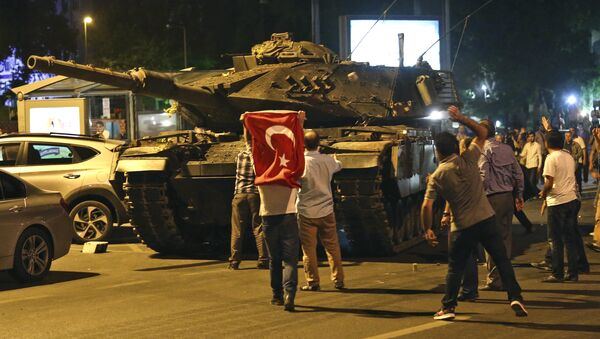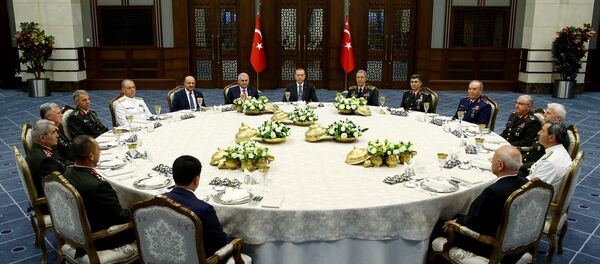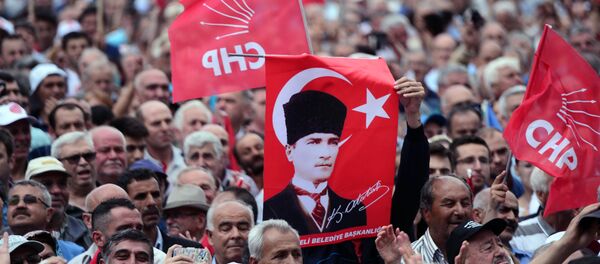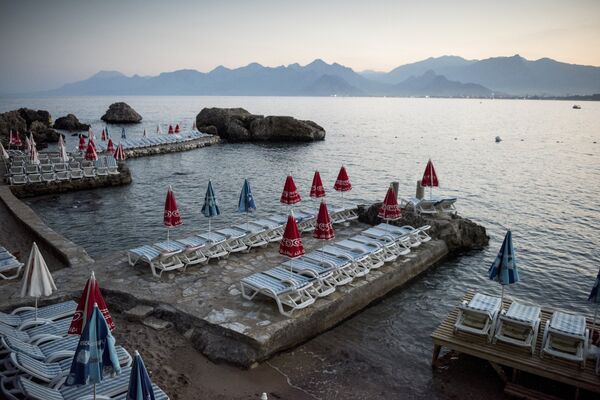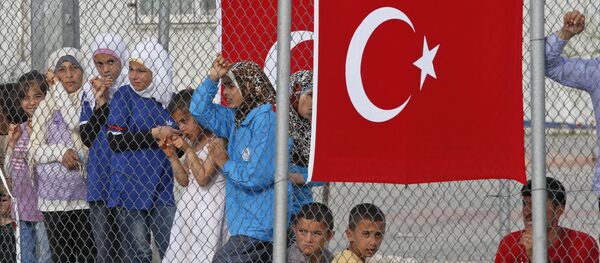The coup was put down in the early hours of Saturday, and Turkey's Foreign Ministry stated the next day that more than 290 people had died in the fighting which ensued between the government's supporters and the military faction which had attempted the coup.
The ministry said that more than 100 of those who died were participants in the coup. More than 1,400 people were wounded, it said.
The Turkish government has blamed the coup attempt on US-based Muslim cleric Fethullah Gulen, and says his followers have formed a "parallel state" within Turkey.
On Thursday a court in Istanbul issued an arrest warrant for Gulen, accusing him of "ordering the 15 July coup attempt." Ankara has also requested that the US extradite Gulen to Turkey, although Washington is reported to be unconvinced of the case against him.
Arrests and Detentions
RIA Novosti reported Anadolu agency's announcement about the suspension or dismissal of more than 66,000 people from state and private institutions, including more than 43,000 people working in the Ministry of Education, more than 8,800 people working in the Interior Ministry and more than 2,700 judges.
The dismissals have even spread as far as state-run Turkish Airlines, which has fired 211 people, and the Turkish Football Association (FA).
"The Turkish Football Association has found it necessary to end its relationship with 94 staff members, including referees, their assistants, members of the regional referee's committee and observers," the FA said, RIA Novosti reported.
Having declared a three-month state of emergency, Erdogan has used emergency powers to close 1,669 institutions the government says have links to Gulen.
Turkey's Interior Ministry Efkan Ala told Anadolu that around 26,000 people had been detained in connection to the failed coup, around 10,000 of whom were arrested.
Turkey's armed forces are the second largest in NATO, and the second largest in Europe after Russia's. In 2014, the Turkish military comprised around 610,000 members, backed by more than 350,000 trained reservists.
Turkey's media has also been subject to the purge. According to the Committee to Protect Journalists, the government has closed more than 100 broadcasters, newspapers, magazines, publishers, and distribution companies. At least 88 arrest warrants have been issueв for journalists, media workers, and shareholders.
The Rule of Law
On July 20 President Erdogan announced the beginning of a three-month state of emergency, allowing his government to restrict or suspend rights and freedoms and bypass parliament when drafting new laws.
Turkey is one of 47 members of the Council of Europe, and signed the European Convention on Human Rights in 1950. However, Ankara has suspended the treaty, referring to the example set by France after last year's Paris terror attacks.
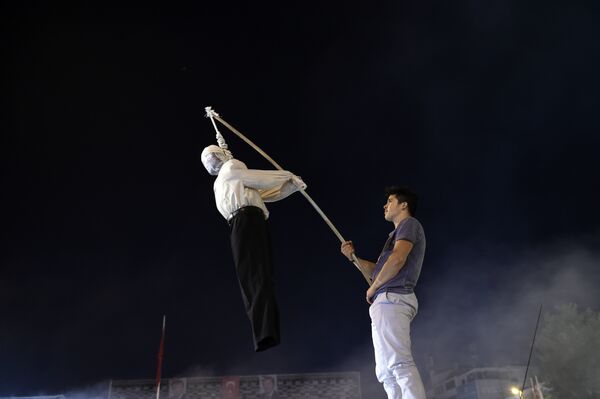
"What do the (Turkish) people say today?" Erdogan asked rhetorically during an interview with German television station ARD late last month.
"They want the death penalty reintroduced. We as the government must listen to what the people say. We can't say 'no, that doesn't interest us,'" said the president, who also told Italian TV channel RaiNews24 that "fifty seven percent of citizens are in favor (of reintroducing the death penalty)."
Financial Costs
On Tuesday Turkish Customs and Trade Minister Bulent Tufenkci estimated the immediate financial cost of the failed coup attempt in Turkey to be at least 300 billion Turkish Lira ($100 billion).
"When we consider all those warplanes, helicopters, weapons, bombs and buildings, the cost is 300 billion liras at minimum according to our prior calculations," said Tufenkci, who predicted Turkey's already depressed tourist industry will suffer further losses.
"There will also be various costs in the medium-term. For instance, many orders from abroad have been canceled. Many foreigners have halted their Turkey visits. The coup plotters have unfortunately created an image of Turkey [which makes it look] as if it were a third world country. People who see tanks in the streets and the parliament bombed will not come to Turkey. All of these create costs in the medium-term," said Tufenkci, Hurriyet reported.
Prior to the coup attempt, in the second quarter of 2016 Turkey's tourism revenue had already fallen by 35.6 percent compared to the same period of 2015, to less than $5 billion.
The EU-Turkey Migration Agreement
The migrant deal reached by Ankara and the EU in March 2016 stipulates that the EU grant Turkish nationals visa-free travel to the bloc, and Turkey's Foreign Minister Mevlut Cavusoglu has said that Turkey will break the agreement unless the condition is granted, potentially allowing hundreds of thousands of migrants to cross the Aegean Sea to Europe.
"It could be the beginning or end of October, but we are waiting for a firm date," Cavusoglu told Germany's Frankfurter Allgemeine Zeitung (FAZ) newspaper, warning that if Turkey does not receive visa-free travel, then "we will be forced to withdraw from the March 18 agreement."
According to the March 18 agreement, the EU was supposed to grant Turkish citizens visa-free access to the EU by the end of July, and pay Turkey — initially — US$3.95 billion to bolster its refugee camps and accept "irregular" migrants denied asylum in Greece in return — on a one-for-one basis — for Syrian refugees in Turkey being relocated to the EU.

In addition, the German press has reported a growing number of asylum applications from Turkish citizens this year, in the months preceding the failed coup attempt. According to the Tagesspiegel newspaper, 1,710 Turkish citizens, of whom 1,510 are Kurds, applied for asylum in Germany between January and June this year.
According to Germany's Federal Office for Migration and Refugees, in the whole of 2015 there were 1,767 asylum applications from Turkish citizens, 1,428 of whom were Kurds.

